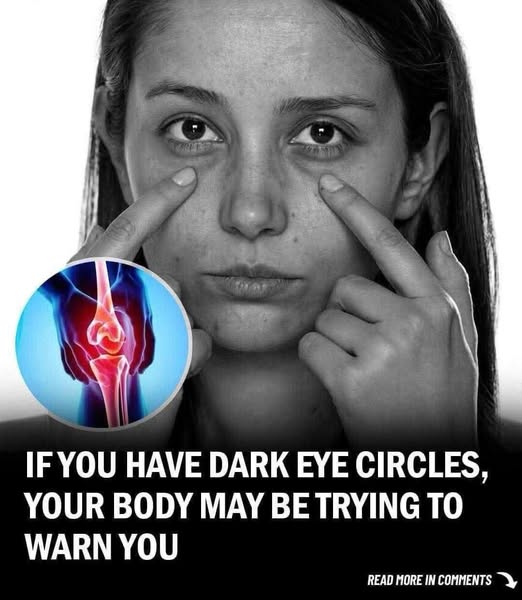You should know this
Dark circles under the eyes are often dismissed as a cosmetic issue or a result of lack of sleep. However, persistent or worsening dark circles may actually be your body’s way of signaling deeper health concerns. Here’s what they could be trying to tell you:
🌙 1. Lack of Sleep and Fatigue
One of the most common causes of dark under-eye circles is sleep deprivation. When you don’t get enough rest, your skin can become pale, making blood vessels more visible under the eyes. Additionally, poor sleep can lead to fluid retention, which may cause puffiness and shadowing.
Solution: Aim for 7–9 hours of quality sleep per night and try to maintain a consistent sleep schedule.
💧 2. Dehydration
When your body is not properly hydrated, your skin loses elasticity and appears dull, especially in thinner areas like under your eyes. This can lead to sunken eyes and enhanced dark circles.
Solution: Drink at least 8 glasses of water daily and reduce consumption of dehydrating substances like caffeine and alcohol.
🧬 3. Genetics and Skin Tone
Sometimes, dark circles are hereditary. People with darker skin tones may naturally have more pigmentation under the eyes due to excess melanin or thin skin that makes blood vessels more noticeable.
Solution: While genetics can’t be changed, using sunscreen, brightening eye creams, and healthy habits can help reduce the appearance.
🍔 4. Poor Nutrition
Deficiencies in nutrients such as iron, vitamin K, vitamin B12, and antioxidants can contribute to dark circles. Iron deficiency anemia, in particular, reduces oxygen delivery to tissues, making the skin look tired and discolored.
Solution: Eat a balanced diet rich in fruits, vegetables, lean proteins, and whole grains. Consider blood tests if you suspect a deficiency.
🧠 5. Stress and Mental Exhaustion
Chronic stress can affect your hormonal balance and blood circulation, making dark circles more visible. It also contributes to fatigue, which worsens the condition.
Solution: Practice relaxation techniques such as meditation, deep breathing, or yoga to manage stress levels.
🌿 6. Allergies or Sinus Problems
Dark circles can appear due to allergic reactions or sinus congestion. This leads to increased blood flow near the eyes and can cause swelling and discoloration. The urge to rub your eyes also worsens the condition.
Solution: Treat allergies with antihistamines or consult a doctor. Use cold compresses and avoid rubbing your eyes.
💊 7. Liver or Kidney Issues
In some cases, dark circles may point to liver congestion or kidney imbalance. These organs help detoxify your body, and when they’re overburdened, toxins may manifest as skin discoloration under the eyes.
Solution: Consult a doctor if dark circles are persistent and accompanied by other symptoms like fatigue, yellowish skin, or swelling. A blood or urine test may be required.
🦴 8. Early Signs of Joint or Bone Issues
Dark circles under the eyes can sometimes indicate inflammation or poor circulation related to joint or bone health. Chronic joint problems—such as arthritis or autoimmune disorders like lupus or rheumatoid arthritis—may cause systemic inflammation that affects the delicate skin under the eyes, leading to a tired, bruised appearance.
This can also occur if your body is lacking essential minerals like calcium, magnesium, or vitamin D, which are crucial for maintaining strong bones and joints. A long-term deficiency may weaken the musculoskeletal system and reflect physically in unexpected ways—such as facial pallor and shadowing under the eyes.
Solution:
- Ensure a diet rich in calcium (leafy greens, dairy), magnesium (nuts, seeds), and vitamin D (sunlight, eggs, fish).
- Get regular checkups if you have joint pain, stiffness, or swelling.
- Consider a bone density scan if you’re at risk of osteoporosis or other bone-related conditions.
🧴 How to Reduce Dark Circles Naturally
- Apply cold tea bags or cucumber slices to the eyes
- Use creams with vitamin C, retinol, or caffeine
- Stay hydrated and reduce salt intake
- Get plenty of sleep
- Wear sunscreen to prevent skin damage
🚨 When to See a Doctor
If your dark circles:
- Appear suddenly or worsen rapidly
- Are accompanied by swelling or pain
- Don’t improve with lifestyle changes
- Come with other health symptoms
…it may be time to consult a healthcare professional.
✅ Conclusion
Dark eye circles are more than just a cosmetic nuisance. They may reflect sleep habits, lifestyle choices, nutritional deficiencies, or underlying health conditions. Paying attention to this subtle sign can help you catch imbalances early and take steps toward better health.
